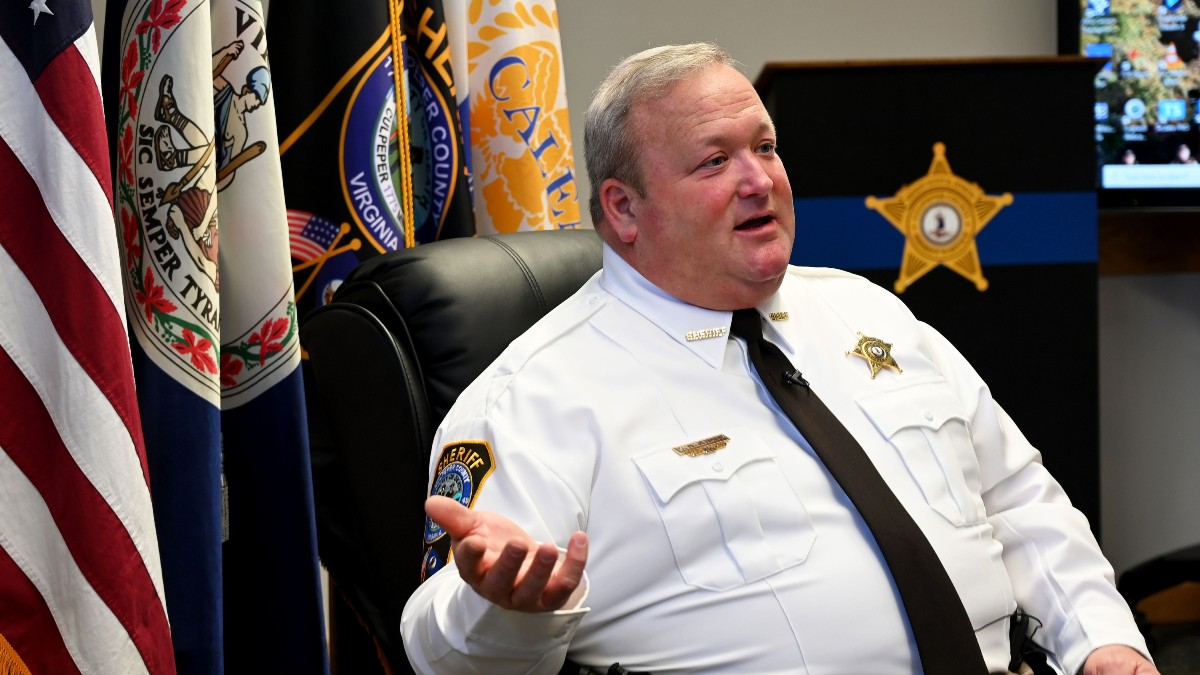When the pandemic shut down the world, Darnley Hodge and his wife needed a way to keep their three small children safe but entertained. That’s why the Prince George’s County family spent their summers exploring nearby beaches along the Chesapeake Bay.
But when the family arrived to Brownie’s Beach in Bayfront Park – a stamp-size beach in Calvert County – they were surprised to be greeted with a sign stating non-residents weren’t allowed to enter. In June 2020, the Chesapeake Beach Town Council voted to close the beach to out-of-towners because of the public health emergency. The following year, they voted to allow the county’s first responders, too.
Hodge said while he found the policy unusual, it wasn’t until the town voted this year to extend the restrictions to 2025 that he became upset.
“I was immediately a bit skeptical as to the actual motivation behind it” in 2020, Hodge said. “It turns out, three years later, some of my suspicions were supported by some of the statements that were recently made by the lawmakers in town.”
We're making it easier for you to find stories that matter with our new newsletter — The 4Front. Sign up here and get news that is important for you to your inbox.
In a March meeting, after a councilman raised concerns from businesses about prohibiting their guests or other tourists on the beach, Mayor Pat Mahoney countered by saying, “I’ll be the voice of the south side now. Quote-unquote: We don’t want them people down here.”
Hodge wasn’t the only one concerned by the comments.
“The way that he said it, it is definitely perceived as a discriminatory term,” said longtime Chesapeake Beach resident Denise Plater.
Investigations
Investigations by the News4 I-Team
Plater, who is Black, said she doesn’t know if the mayor was referring to a specific demographic, but she knows it didn’t sit well with many of her friends and family. Census data shows Chesapeake Beach is more than 80% white, with African Americans making up less than 10% of its residents. Plus, she said, many of the town’s tourists come from predominantly Black areas.
“I'm not quite sure if [local leaders] fully understand or if they actually have the knowledge to understand how it's perceived to the people in the community, especially the people in the Black and brown community,” she said.
The local teacher said while she supported the restrictions at the start of the pandemic, she doesn’t now.
“I have family who live in D.C., Prince George's County, St. Mary's County and Charles. And when those family members come to visit, I don't want them to feel like they can't go down to the beach without having me with them,” she said.
The I-Team made multiple attempts to ask Mahoney about those comments, but he did not respond.
In a statement to The Southern Maryland News, however, he said that by “them people,” he meant “tourists” and “fossil hunters."
Chesapeake Beach Councilman Greg Morris defended his colleague to News4, telling the I-Team he believes the mayor’s comments have been taken out of context.
“I don't feel that the mayor had any kind of malice or intent with that,” Morris said. “He was speaking for us, too, to a limited extent, and it was in the context of limiting folks at Bayfront Park and limiting it to municipal taxpayers.”
Morris echoed some of the concerns local residents who told News4 in past years, tourists would crowd the narrow residential streets by the beach and cause parking problems. Plus, at less than a half-acre wide, Brownie’s Beach is small and ecologically fragile and located next to dangerous cliffs that have collapsed in the past.
Tourists are also able to drive just a short distance to other, larger beaches in the area, many noted, where they can pay for access.
“Decisions that are made here at this town hall are open to reevaluation from time to time, as all policies should be, which include previous policies that have allowed thousands of out-of-town visitors to mob our small beach over there,” Morris said.
Mary Lanham, whose family has owned the local Rod 'N' Reel Resort for generations, worries the policy isn’t just harming businesses, but sending a troubling message.
“I feel like it's the mentality that, once people come to town, they want to shut the gate and keep everybody else out,” Lanham said. “And I want to work with leadership that the message is ‘we’re open for business.’ We want people to come to this town. We want to show them the town that we love so much.”
Legal experts told the I-Team they aren’t familiar with case law challenging this exact issue in Maryland but said in other states people have sued over towns restricting access to public spaces and won.
In 2001, for instance, the Connecticut Supreme Court sided with a man who sued the Town of Greenwich for closing a beach to non-residents, ruling the public has a constitutional right to exercise free speech in such a space.
Andrew Kahrl, a University of Virginia professor who has studied the history of segregation and exclusion along the country’s shorelines, said, "The battles and fights over beach access are about beaches, but they're about more than beaches. They're about public rights to public space."
At the start of the pandemic, Kahrl wrote an opinion piece in The New York Times predicting beach towns would use the public health emergency to close or restrict access to its shores.
“It's sadly ironic because, I mean, beaches and these types of public spaces should be places to bring people together. And I think that's something that, sadly, in the history of shorelines, has often been the opposite,” he said.
When the I-Team asked the town about the extension to 2025, the town administrator provided town code charging officials with maintaining “public parks, gardens, playgrounds, and other recreational facilities and programs to promote the health, welfare, and enjoyment of the inhabitants of the town.”
To that, Kahrl said, “Think about the implications of this … Are we looking at a world where you have to sort of present your local tax receipt or some sort of proof of residency to walk through a public park, or to walk down sidewalks?”
The town’s website states the beach is monitored and “guests found to be on site will be required to provide a government issued photo ID confirming their resident status.” It also states “any violators will be trespassing.”
The town administrator told the I-Team the town has only issued one trespassing violation since the start of the restrictions.
This story was reported by Tracee Wilkins, produced by Katie Leslie and shot and edited by Jeff Piper.



